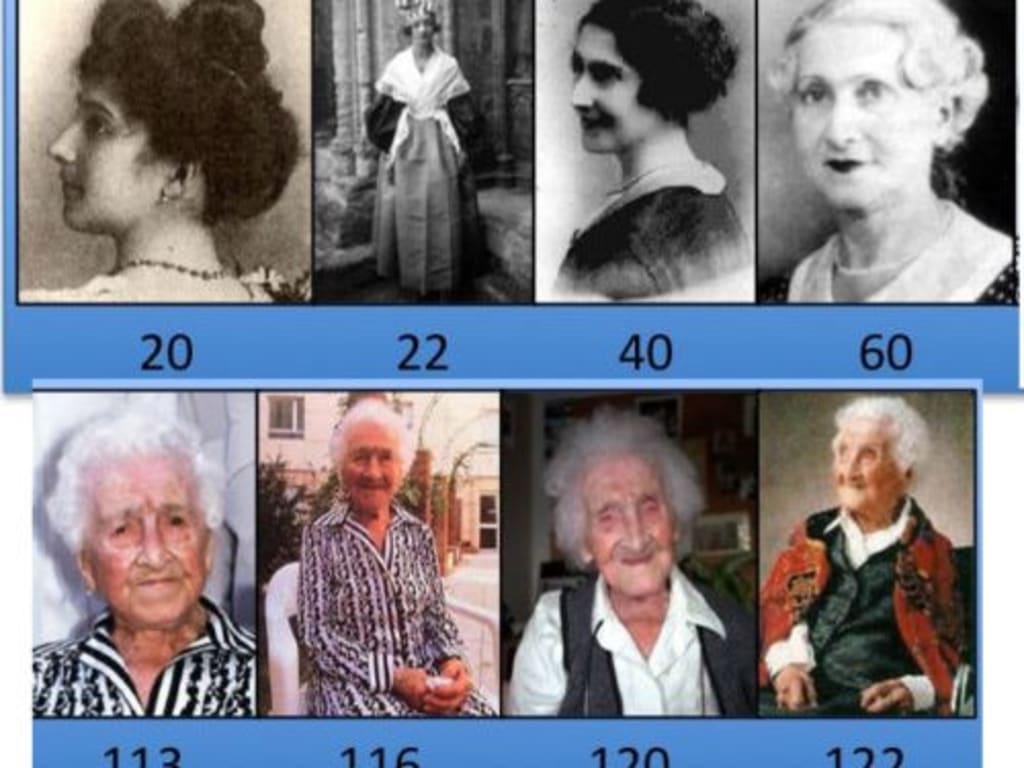The puzzle of world`s oldest human
Unraveling the Mystery of the World's Oldest Human

In 1875, a little girl named Jeanne Louise Calment was born in the charming town of Arles, France. Back then, cars and airplanes were still just figments of imagination. People relied on horse-drawn carriages to travel and used candles to illuminate their homes.. When Louise was just 14 years old in 1889, the iconic Eiffel Tower was being constructed in Paris. And at the age of 21, in 1896, she got married. Fast forward to 1914, when Louise was 39 years old and enjoying a blissful married life with a daughter, a devastating explosion shook Europe, marking the beginning of World War I. In 1934, as Hitler's influence grew in Germany, tragedy struck Louise's family. Her beloved daughter passed away from a lung infection at the age of 59. It's worth noting that 59 is an age when most women have already become grandmothers. However, Louise herself couldn't have fathomed that her life was not even halfway over. By 1942, World War II was raging across Europe, claiming the lives of millions and tearing families apart. Unfortunately, Louise experienced a similar loss when she lost her husband at the age of 64. Louise's life was filled with both joy and sorrow, witnessing significant historical events and enduring personal hardships. Little did she know that her remarkable journey was far from over.
Louise, at the age of 72, witnessed the pages of history turning without even realizing it. Throughout her life, she saw horses being replaced by cars and candles being substituted with electricity. Then, in 1969, as she celebrated her 94th birthday, humans achieved the remarkable feat of stepping foot on the moon. It truly was a momentous occasion, forever etched in the annals of history.
Louise, at the remarkable age of 110, had been happily residing in her own home. However, at a certain point, she made the decision to move into a nursing home. It was in the year 1988 when the world finally started to take notice of Louise. Her name was on everyone's lips and she became a newsworthy figure as the oldest living human. Sadly, in 1997, at the incredible age of 122, Louise passed away. It was during a time when computers and the internet had already become a part of everyday life. Jeanne Louise Calment surpassed all expectations and achieved a record that remains unbroken to this day. What was the secret behind her longevity? What was the key to living such an extraordinary life?
The initial thought that comes to mind is that luck must have played a role. It's true that if you want to live for 122 years, you'll need a lot of luck. However, the question here is how much of that long life is due to luck and how much is a result of your lifestyle choices? Between 1870 and 1900, Denmark conducted scientific research on twins to study longevity. They analyzed over 2,800 twins to determine the influence of genetics, lifestyle, and environment. This study, known as the famous Danish twin study, concluded that genes only dictate 20% of an average human's life, while lifestyle and environment have an 80% influence. This means that your food choices, exercise habits, and overall healthy lifestyle have a significant impact on your longevity. The team of researchers and population experts are exploring the globe and have discovered five unique Blue Zones. The first one is located in Sardinia, Italy. The second can be found in Okinawa, Japan. The third is situated in Loma Linda, California, home to the Seventh-day Adventist community. This community is a Christian sect. The fourth Blue Zone is on the island of Icaria, Greece. Lastly, the fifth Blue Zone is in the Nicoya Peninsula region of Costa Rica. The residents of these Blue Zones tend to live longer lives compared to the global average. What makes these places so special? Could it be the pristine water and air, or perhaps the lifestyle choices of the people living there that contribute to their longevity?
When their report is published, they state that the true cause was the residents' lifestyle habits. In particular, there were 9 common habits found in these areas. They are referred to as Power 9. Let's explore each one individually so that you can gain knowledge from them, apply them to your life, and enjoy a long and healthy life. The initial lifestyle habit we'll discuss is "Moving Naturally." These individuals live in an environment that promotes small, natural movements throughout the day. For instance, many of them reside in villages where cars are not heavily used. Instead, they rely on walking to meet friends or commute to work. Additionally, they cultivate gardens near their homes. It's important to note that natural walking is quite uncommon in our modern lifestyle. According to a survey conducted by the American Cancer Society, sitting for more than 6 hours a day increases the risk of mortality by 19% over the next 21 years. Therefore, incorporating natural walking into your daily routine is highly beneficial. The key is to integrate natural movements into your everyday life as much as possible.
Another important aspect is purpose. Unlike the concept of retirement, research has shown that having a sense of purpose in life can actually extend your lifespan by up to 7 years. What's fascinating is that having a life purpose doesn't have to be something grand that changes the world. It can be the simple things that bring you long-term satisfaction and internal happiness in your everyday life. These things can also serve as your purpose.
Number 3, Shift down. Stress is harmful to our health. Research shows that work-related stress can shorten your life by 33 years. What makes people in blue zones unique? It's not that they never experience stress. The key is that they have incorporated stress-reducing habits into their daily lives. Taking a nap in the afternoon for 1-2 hours has been proven to enhance cardiovascular health. They also have a social hour from 5 PM to 7 PM where they connect with loved ones. Moving on to point number 4, the 80% rule. When eating, stop when your stomach is 80% full. Overeating to 100% fullness is not recommended. Eating less has scientifically proven benefits. Lastly, point number 5, Plant-based focus. The majority of people in blue zones follow a plant-based diet. This includes a variety of vegetables and tubers, such as sweet potatoes, potatoes, nuts, and beans.
Point number 6, Wine. This point is a topic of much debate as people consume alcohol in moderation. Point number 7, Belong, refers to the sense of belonging. It doesn't matter what religion you follow, or if you follow one at all. Being part of a social or spiritual community is important. This community can be your religious group or any group that gives you purpose, peace, and a positive outlook on life. Another way to achieve this is through community service, volunteering, helping others, or charity work. Point number 8, Loved Ones First. People in blue zones prioritize their family, often living near or with their aging parents and grandparents. Lastly, the 9th point is Right Tribe. Those in blue zones are part of social circles that support healthy behaviors. Research shows that habits like smoking, obesity, happiness, and loneliness can be contagious. Surrounding yourself with friends who promote good habits can be very beneficial for you.
It is definitely achievable to live a long life beyond the 5 blue zones. Singapore serves as a prime example where government policies play a crucial role in promoting a healthy lifestyle. The government implements policies that subsidize nutritious food while imposing high taxes on unhealthy junk food. Additionally, there is a strong emphasis on walking, with heavy taxes on driving to deter it. By following these guidelines, you can increase your chances of living a century or more.
About the Creator
Agha Sabir
Embark on an unforgettable journey through worlds of wonder and mystery.
Enjoyed the story? Support the Creator.
Subscribe for free to receive all their stories in your feed. You could also pledge your support or give them a one-off tip, letting them know you appreciate their work.






Comments
There are no comments for this story
Be the first to respond and start the conversation.